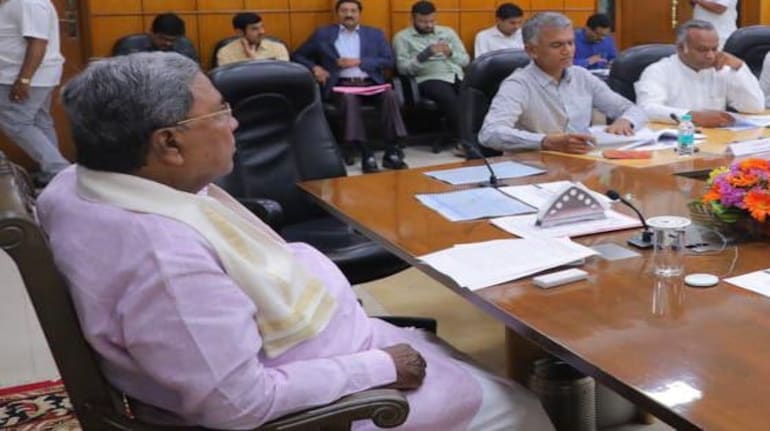



Karnataka, the home for major skill-gaming companies such as Gameskraft and Mobile Premier League, appears to be divided over the GST Council’s recent decision to levy 28 percent on the online real-money gaming sector.
Karnataka's revenue minister, Krishna Byre Gowda, who represented the Congress-led state in the GST council, did not oppose the decision.
"He holds the view that online gaming falls under betting and fully supports the 28 percent Goods and Services Tax (GST) on online gaming," a source close to Gowda told Moneycontrol. Gowda was unavailable for comment, despite repeated attempts.
Representing Karnataka at the 50th GST Council meeting. Day long deliberations on various GST related issues. #GSTCouncil #revenueminister #govtofkarnataka #karnataka #bengaluru #byatarayanapura pic.twitter.com/zsaC8YkNdg— Krishna Byre Gowda (@krishnabgowda) July 12, 2023
Karnataka information technology and bio-technology (IT-BT) minister Priyank Kharge, however, has criticised the council's decision.
"The problem is not whether Gowda and I are at loggerheads. The bigger story is that it is unfortunate that despite Rajeev Chandrasekhar (Union minister of state for electronics and information technology) being at the helm of affairs, who is from Karnataka, Nirmala Sitharaman (Union finance minister) hailing from Karnataka (Rajya Sabha MP), they are unable to make a distinction between gaming and betting," IT-BT minister Kharge told Moneycontrol.
Kharge said that there will always be differing perspectives, as it also depends on how Gowda interpreted the situation.
“Gowda is a GST Council member, and whatever he says represents the state's position—I'm not denying that. Gowda's thinking is right. However, the issue arose because the gaming companies registered here or the federations didn't approach us earlier; if they had, I would have arranged a joint meeting to ensure clarity. Gowda, the gaming federation, and I have never had a joint discussion before because they never approached us earlier,” the minister said.
“Chandrashekhar had said he will write to Sitharaman again. If necessary, the state government will intervene. States like Goa, Assam, and Mizoram have also opposed the GST council's decision," he said.
In April, MeitY notified new gaming-related amendments to the IT Act 2021. These amendments will allow multiple self-regulatory organizations (SROs) to determine whether a real-money game, where the transfer of money is involved, is permitted to operate in India.
Last week, Chandrasekhar said the ministry is still in the "nascent stages" of creating a "predictable, sustainable, and permissible" online gaming framework.
Once the framework is established, the ministry will communicate with the GST council, requesting them to consider the new regulatory framework for taxation, Chandrasekhar had said.
It's worth noting that these tax rates do not apply to free-to-play and paid video games in the country, where the 18 percent GST rate is already included in the app sales on Google Play and Apple App Store.
"There's a very thin line between what gaming companies are asking and what the Union government has done. So we have to tread carefully, keeping gaming alive without making betting legal," Kharge said.
On July 11, the GST Council decided to impose the top GST slab of 28 percent on the full value of money paid by users to play skill-based games uniformly, with no distinction made between games of skill and chance. Gaming platforms currently pay an 18 percent GST on platform fees.
This decision, which came after years of deliberation, shocked the country's fast-growing real-money gaming industry. Several industry executives and associations have warned that this move will "wipe out the entire industry and lead to job losses".
"We are against betting in all forms. However, if we impose a blanket restriction, without differentiating between skill and chance, it will become difficult for the industry to survive," Kharge said.
He highlighted that players aren't protected under such circumstances. "So, it could lead to players seeking options outside the country if it's restricted here. They will play with Chinese firms, and those located in Europe and elsewhere. Whenever they get cheated, we can't take any action."
Earlier on July 13, Kharge said that the 28 percent GST on real-money gaming is a setback to the $1 trillion digital economy target.
On July 21, a group of 30 prominent domestic and international startup investors, including Tiger Global, Peak XV Partners, and Steadview Capital wrote to Prime Minister Narendra Modi expressing their concern over the GST Council's recent decision.
Investors warned that the proposal could lead to a potential write-off of the $2.5 billion in capital invested, as well as the loss of over 50,000 high-skilled jobs. They also added that the proposal would adversely impact prospective investments of at least $4 billion over the next 3-4 years.
The letter from investors comes on the heels of a group of around 130 real-money gaming startup founders, CEOs, and industry associations signing an open letter to the government, requesting them to reconsider the GST levy.
The new GST levy on real-money gaming could lead to a 1,000 percent increase in indirect taxes for the industry, skill-based gaming founders and investors have previously told Moneycontrol.
The real-money gaming segment accounted for 77 percent of India's gaming sector revenues in 2022 which stood at Rs 13,500 crore, as per a recent FICCI-EY report. These revenues are set to grow to Rs 16,700 crore in 2023 and Rs 23,100 crore in 2025, it said.
Discover the latest Business News, Sensex, and Nifty updates. Obtain Personal Finance insights, tax queries, and expert opinions on Moneycontrol or download the Moneycontrol App to stay updated!